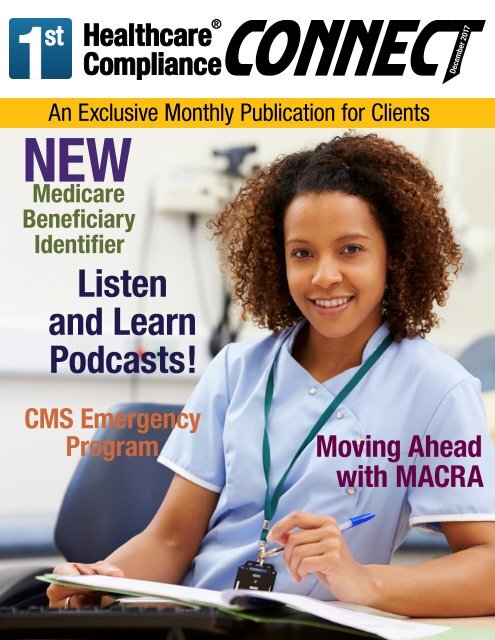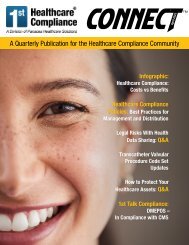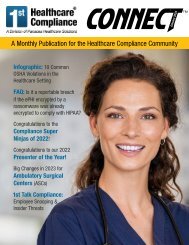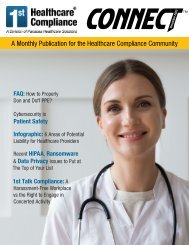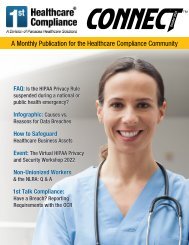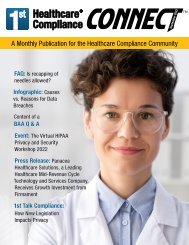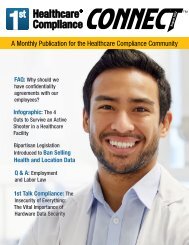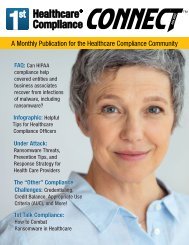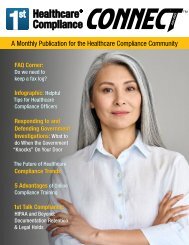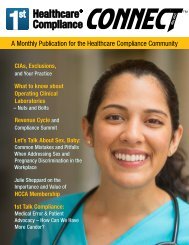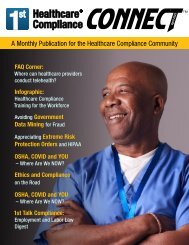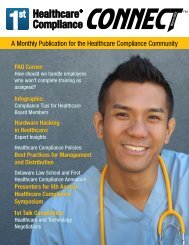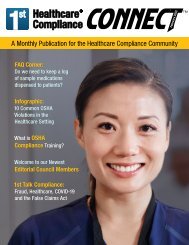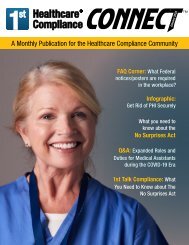First Healthcare Compliance CONNECT- December 2017
Create successful ePaper yourself
Turn your PDF publications into a flip-book with our unique Google optimized e-Paper software.
®<br />
<strong>CONNECT</strong><br />
An Exclusive Monthly Publication for Clients<br />
NEW<br />
Medicare<br />
Beneficiary<br />
Identifier<br />
Listen<br />
and Learn<br />
Podcasts!<br />
<strong>December</strong> <strong>2017</strong><br />
CMS Emergency<br />
Program<br />
Moving Ahead<br />
with MACRA
Important <strong>Compliance</strong> Dates<br />
January<br />
1<br />
January<br />
1<br />
July<br />
1<br />
October<br />
2<br />
November<br />
15<br />
<strong>December</strong><br />
1<br />
<strong>December</strong><br />
February<br />
15<br />
<strong>2017</strong> EHR Stage 2 Medicaid reporting period is a minimum of any<br />
continuous 90 days between January 1 and <strong>December</strong> 31, <strong>2017</strong>.<br />
<strong>2017</strong> EHR Stage 3 Medicaid (for all new and returning participants)<br />
reporting period is a minimum of any continuous 90 days between<br />
January 1 and <strong>December</strong> 31, <strong>2017</strong>.<br />
Beginning July 1, <strong>2017</strong>, practitioners in 9 states are required to<br />
report claims data on post-operative visits furnished during the<br />
global period of specified procedures using CPT code 99024.<br />
October 2, <strong>2017</strong> is the last possible day to begin collecting MACRA<br />
performance data.<br />
There are 17 Provider types that must comply with the CMS<br />
Emergency Preparedness Rule by November 15, <strong>2017</strong>.<br />
Virtual Group submissions due to CMS via email to<br />
MIPS_VirtualGroups@cms.hhs.gov by <strong>December</strong> 1, <strong>2017</strong>.<br />
<strong>December</strong> 15, <strong>2017</strong> is the new extended deadline for electronic<br />
submission of OSHA 300/300A Illness and Injury forms for required<br />
establishments.<br />
In This Issue:<br />
Important <strong>Compliance</strong> Dates<br />
Happy Holidays!<br />
Latest System Updates<br />
Moving Ahead with MACRA<br />
2<br />
<strong>First</strong> <strong>Healthcare</strong> <strong>Compliance</strong>, LLC © <strong>2017</strong>
Happy Holidays!<br />
Our team at <strong>First</strong> <strong>Healthcare</strong> <strong>Compliance</strong><br />
wishes you the Happiest of Holidays!<br />
Please enjoy one set of complimentary<br />
compliance posters available from our store at<br />
1sthcc.com/shop<br />
Use coupon code:<br />
TISTHESEASON<br />
Are you a <strong>Compliance</strong> Ninja?<br />
Our monthly <strong>Compliance</strong> Ninja Super User will be selected<br />
by our client services team beginning in January 2018.<br />
You’ll get the honor of the title and cool swag too!<br />
Is your practice ready for the new Medicare Beneficiary Identifier?<br />
Qualifying Events that Trigger COBRA Benefits<br />
CMS Emergency Preparedness Program<br />
Upcoming Webinar Calendar<br />
Contact Toll Free: 888-54-FIRST 3
Latest System Updates<br />
Training Zone<br />
Employee /<br />
Training Zones<br />
OSHA / HIPAA<br />
Zones<br />
Employee /<br />
Training Zones<br />
User Setup<br />
Vendor Zone<br />
Changed Employee view so assignments are still available<br />
past the expiration date if the training has not been<br />
completed.<br />
New option in annual training requirements allowing<br />
employers to turn off the CMS requirement on a per<br />
employee basis.<br />
Added “In Progress” status to the dashboard and changed<br />
the overall status to include “In Progress” items in the<br />
determination.<br />
Added ability for supervisors to specify which individual<br />
managers can assign training to employees.<br />
Implemented new password viewing policy for greater<br />
account security.<br />
Added the ability to enter notes about vendor contracts.<br />
Employee Zone<br />
Added Certification column to the Employee Zone grid and<br />
summary information to the grid at the top of the zone.<br />
In observance of the holidays, our offices will be closed:<br />
Friday, <strong>December</strong> 22, <strong>2017</strong><br />
Monday, <strong>December</strong> 25, <strong>2017</strong><br />
Friday, <strong>December</strong> 29, <strong>2017</strong><br />
Monday, January 1, 2018<br />
4<br />
<strong>First</strong> <strong>Healthcare</strong> <strong>Compliance</strong>, LLC © <strong>2017</strong>
Get the eBook!<br />
Are you ready for MACRA?<br />
It’s important to understand how MACRA and the final rule published on November<br />
2, <strong>2017</strong>, will impact your bottom line when it goes into effect on January 1, 2018.<br />
Get help and determine your best course of action!<br />
®<br />
Moving Ahead<br />
with MACRA<br />
Learn more about getting on<br />
track with MACRA:<br />
• Common Misconceptions<br />
• MIPS Hurdles<br />
• Creating a MIPS Action Plan<br />
By Julie Sheppard, BSN, JD, CHC<br />
Download your copy today!<br />
Contact Toll Free: 888-54-FIRST 5
By Jill Brooks, MD, CHCO<br />
Preventing identity theft continues to be a major focus of the<br />
Social Security Administration and the Center of Medicare and<br />
Medicaid Services (CMS). Beginning April 2018, Medicare cards<br />
will no longer contain Social Security Numbers (SSN) as part of<br />
the Social Security Number Initiative (SSNI) and Medicare Access<br />
and CHIP Reauthorization Act (MACRA). Instead, Medicare<br />
beneficiaries will be assigned a new randomly generated individually<br />
identifiable number— the Medicare Beneficiary Identifier<br />
(MBI). Accordingly, your practice management systems must<br />
be updated to accept and protect the confidentiality of these new<br />
MBI numbers.<br />
Educational materials are now available for providers to help educate<br />
their Medicare patients on the new MBI: a poster, flyer and<br />
a tear off. CMS emphasizes that beneficiaries must be assured<br />
that benefits are not changing, only their identifier number. All<br />
existing cards will be replaced and mailed to beneficiaries by<br />
April 2019. Once the new MBI card is received, the beneficiary<br />
should use it instead of the old card with the SSN-based Health<br />
Insurance Claim Number (HICN), however either number should<br />
be accepted by the provider until <strong>December</strong> 31, 2019. During the<br />
transition period of April 1, 2018 to <strong>December</strong> 31, 2019, providers<br />
may submit claims using the MBI or the Health Insurance Claim<br />
Number (HICN). Following the transition period, only a few exceptions<br />
will exist to allow for submissions containing any identifier<br />
other than the MBI:<br />
• MBI or HICN will be allowed for Medicare plan or fee-for-service<br />
appeals<br />
• HICN will continue to be used for Medicare adjustments and<br />
reports<br />
• For a fee- for-service claims status query, a date of service<br />
prior to Jan 1, 2020 will allow use of MBI or HICN but after<br />
that date only the MBI can be used<br />
• MBI or HICN may be used on claims for services as an inpatient,<br />
for home-health care or in a religious, non-medical<br />
healthcare institution that begin before and end after the date<br />
of transition.<br />
6<br />
<strong>First</strong> <strong>Healthcare</strong> <strong>Compliance</strong>, LLC © <strong>2017</strong>
Regardless of the 2019 deadline, providers should be proactive<br />
in compiling the MBIs assigned to their patients. An MBI<br />
look-up tool is available to providers who sign up on their state<br />
Medicare Administrative Contractor (MAC) provider portal.<br />
Beginning October 2018, the new MBI number for the beneficiary<br />
will also be included on each electronic remittance advice<br />
(835) transaction. Another ardent step is to begin identifying<br />
any Railroad Retirement Beneficiaries by their cards which will<br />
continue to display the RRB logo and Railroad Retirement Board<br />
(RRB) at the bottom. Due to the fact that the randomly generated<br />
MBI number will not be unique for a RRB member, your<br />
process must be able to determine RRB status simply based on<br />
their card, in order to properly direct claims to the RRB Specialty<br />
Medicare Administrative Contractor (SMAC).<br />
What specific changes need to be implemented for the MBI to<br />
be accepted by your practice management system?<br />
• There will be 11 randomly generated characters<br />
• Alphanumeric (0-9 and uppercase letters excluding S, L, O,<br />
I, B, Z)<br />
• 2nd, 5th, 8th, and 9th characters will always be a letter<br />
• 1st, 4th, 7th, 10th, and 11th characters will always be a<br />
number.<br />
• 3rd and 6th characters will be a letter or a number<br />
• The dashes are not part of the MBI<br />
• Read and accept the MBI on electronic remittance advice<br />
transaction (835)<br />
Another consideration for providers is private insurance claims.<br />
Private payers do not need to use the new MBI unless if it’s<br />
secondary insurance for a Medicare transaction that would<br />
currently use the HCIN. Only those private payer member IDs<br />
based on whole or part of the SSN will need to be changed. The<br />
ultimate goal is to prevent the continuation of healthcare fraud<br />
by protecting the identity of all individuals.<br />
New Card! New Number!<br />
Mailing<br />
in 2018<br />
Current Medicare Card<br />
NEW Medicare Card<br />
CMS Product No. 12009-P<br />
September <strong>2017</strong><br />
Contact Toll Free: 888-54-FIRST 7
Spotlight<br />
Sheba Vine, JD, CPCO talks about Qualifying Events that<br />
Trigger COBRA Benefits.<br />
COBRA is a federal law and is short for the Consolidated<br />
Omnibus Budget Reconciliation Act of 1985. COBRA applies to<br />
employers with 20 or more employees that offer group health<br />
plans. COBRA provides the right to continue coverage in an<br />
employer group plan in certain instances.<br />
If an individual elects COBRA coverage, then he or she is<br />
required to pay the full premium at the group plan rate. In<br />
addition to the premium, the employer can charge a 2%<br />
administration fee.<br />
When determining if an employer has to comply with COBRA,<br />
it must have at least 20 employees. To determine this, both<br />
full-time and part-time employees are counted. A part-time<br />
employee only counts as a fraction, equal to the number of<br />
hours that the part-time employee worked divided by the<br />
hours an employee must work to be considered full time. If<br />
the employer doesn’t have 20 employees, then it is exempt<br />
from COBRA. But many states have a continuing coverage<br />
law that is similar to COBRA. These are referred to as the<br />
mini-COBRA laws.<br />
Under COBRA only qualified beneficiaries have the benefits of<br />
COBRA. A qualified beneficiary is anyone that participates in<br />
the employer sponsored group health plan. This includes all<br />
employees that participate in the group plan, spouses and any<br />
dependent children. It is important to note that the individual<br />
must be covered by the plan on the day before an event that<br />
causes loss of coverage.<br />
There are instances where COBRA benefits would not apply<br />
such as an employee who is not eligible to participate or an<br />
employee who has declined to participate in the health plan.<br />
There are notices that the employer is required to provide under<br />
COBRA. A general notice of COBRA rights must be provided<br />
to covered employees and spouses, within the first 90 days of<br />
coverage under the plan. Employers usually include this notice<br />
in the Summary Plan Description. There is also the election<br />
notice, which describes the right to COBRA continuation coverage<br />
and how to make an election when there is a qualifying<br />
event that causes an employee and his or her family members<br />
to lose health coverage. A qualifying event triggers the right<br />
to COBRA coverage which includes: 1) an employee’s voluntary<br />
or involuntary termination of employment, unless it is due<br />
to the employee’s gross misconduct. Although COBRA does<br />
not define what counts as gross misconduct, many states<br />
refer to the definition provided under the respective state’s<br />
unemployment laws; 2) reduction in hours of employment if<br />
it effects their eligibility under the health plan; 3) divorce or<br />
legal separation of the spouse from the covered employee;<br />
4) an employee’s entitlement to Medicare; 5) the death of a<br />
covered employee; and 6) the loss of dependent status, for<br />
example, when a dependent reaches an age that no longer<br />
qualifies them for coverage under the parent’s health plan.<br />
An individual that elects coverage under COBRA can stay on<br />
the employer’s group health plan for a maximum of 18 or 36<br />
months, depending on the type of qualifying event.<br />
Now that we know what events trigger COBRA, let’s talk<br />
about COBRA and FMLA. FMLA applies to employers with 50<br />
or more employees and it provides up to 12 weeks unpaid job<br />
protected leave for an employee’s serious health condition, for<br />
the birth, adoption, or foster of a child, or for the employee to<br />
care for a family member’s serious health condition. It also<br />
applies for qualifying military leaves which provides for 26<br />
weeks of unpaid job protected leave. For an employee to be<br />
Listen to the <strong>First</strong> <strong>Healthcare</strong> <strong>Compliance</strong> podcast!<br />
8<br />
<strong>First</strong> <strong>Healthcare</strong> <strong>Compliance</strong>, LLC © <strong>2017</strong>
eligible for these FMLA benefits, the employee must have worked for the employer for 12 months and have worked at least 1250<br />
hours.<br />
During any FMLA leave, an employer must maintain the employee’s coverage under any group health plan. Employer contributions<br />
must be the same as if the employee had continued to work his/her normal schedule. This means that if the health plan requires<br />
an employee to work 30 hours a week to maintain coverage, and if that employee goes out on FMLA leave for 12 weeks, then<br />
although the employee is not meeting his 30-hour requirement, the employer is legally required to continue the employee’s health<br />
coverage. If the employee fails to pay any premium amount to keep up the health insurance then the employer may terminate<br />
coverage provided that it gives advance written notice to the employee.<br />
What if the employee in this example needs to extend his or her leave beyond the 12 weeks that FMLA provides, due to a disability<br />
accommodation under the Americans with disability act? What happens to their health coverage? In this case, the employer is no<br />
longer required to maintain health insurance as FMLA benefits have ended and if they have a 30 hour a week eligibility requirement<br />
then this is not being met so health insurance cannot continue. At this juncture, there is a qualifying event because there is<br />
a reduction in hours and the employer is required to provide a COBRA election notice informing the employee and other qualified<br />
beneficiaries of their right to continue coverage through COBRA.<br />
What if the employee suffers a job-related illness or injury and is placed on a worker’s compensation leave of absence? If the<br />
employer has to comply with FMLA and the employee is eligible, the leave may come covered under FMLA and the employer<br />
would be required to continue health insurance coverage. But what if the employer does not have 50 or more employees to come<br />
under FMLA and there is no state law equivalent? <strong>First</strong> the employer should review the health plan requirements to determine if<br />
coverage extends through a workers’ compensation leave. If the plan requires certain hours of work to be met each week, then<br />
the employee would be ineligible for coverage. Due to the reduction in hours, this would be a qualifying event that triggers COBRA<br />
and the employer would be required to provide the individual with an election notice.<br />
<strong>Compliance</strong> with COBRA is as simple as providing the right notices and understanding when COBRA benefits are triggered. But if<br />
the employer fails to notify individuals of their rights to continue coverage, then this single error can expose the employer to lawsuits<br />
with huge penalties and attorney’s fees. It is critical to ensure employer obligations are followed. For more information visit the<br />
Department of Labor’s website where you can find sample general and election COBRA notices.<br />
Check out some of our other great resources to answer your FMLA and employee benefits questions!<br />
Contact Toll Free: 888-54-FIRST 9
Join us on Social Media!<br />
10<br />
<strong>First</strong> <strong>Healthcare</strong> <strong>Compliance</strong>, LLC © <strong>2017</strong>
The most comprehensive healthcare<br />
compliance course yet!<br />
The Fundamentals is a user-friendly, four-module course designed<br />
to help healthcare professionals understand the<br />
essential principles and practices of compliance.<br />
Written by our “dream team” of<br />
healthcare providers and attorneys,<br />
The Fundamentals Course is packed<br />
with useful, easy-to-understand<br />
information that covers HIPAA, OSHA,<br />
employment law and enforcement of<br />
Federal healthcare laws. The course<br />
takes less than four hours to complete.<br />
Visit 1sthcc.com/shop to<br />
register today!<br />
Contact Toll Free: 888-54-FIRST 11
Join Us for These Upcoming<br />
Learning Oportunities!<br />
Complimentary CEU Webinars<br />
January 9th @ 12pm ET<br />
Strategic Planning To Action: Becoming<br />
a Culturally Competent Organization<br />
Dawn Cooper<br />
The Arc of the United States<br />
January 23rd @ 12pm ET<br />
Red Flag Rule - HIPAA <strong>Compliance</strong><br />
Todd Sexton<br />
Identillect Technologies<br />
Listen and Learn Podcasts<br />
Featured January 16th<br />
Unauthorized Access<br />
Ray Ribble<br />
SPHER, Inc.<br />
Featured January 30th<br />
Security Management in<br />
<strong>Healthcare</strong> Facilities<br />
Steven S. Wilder, BA, CHSP, STS<br />
Sorensen Wilder and Associates<br />
Now available in our training zone!<br />
CEUs from the following organizations:<br />
AAPC<br />
ADCA<br />
AHCAE<br />
AHIMA<br />
APMBA<br />
ARHCP<br />
HBMA<br />
MAB<br />
NAMAS<br />
NHCLA<br />
PAHCOM<br />
PAHCS<br />
PHIA<br />
PMI<br />
PMRNC<br />
POMAA<br />
Contact our Client Services Team with any questions!<br />
888.54.FIRST or clientservices@1sthcc.com<br />
12<br />
<strong>First</strong> <strong>Healthcare</strong> <strong>Compliance</strong>, LLC © <strong>2017</strong>


